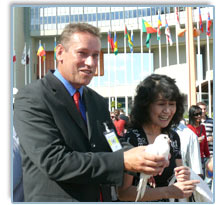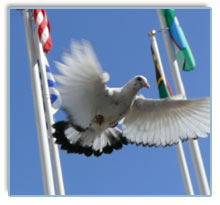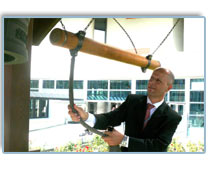
More than 150 people, including UN staff of Vienna-based organizations, watched the release of 100 white peace doves at the Vienna International Centre as part of a memorial event to remember the destruction of Hiroshima and Nagasaki in August 1945 and to advocate non-proliferation and disarmament.
Three hundred origami - a symbol for peace - which were folded by Viennese school children were distributed to visitors and UN staff in Memorial Plaza.
The event on Friday, 7 August, was organized by the United Nations Information Service (UNIS) Vienna, in cooperation with the Vienna NGO Committee on Peace, and the musician Yuko Gulda.
UNIS Vienna Director Maher Nasser opened the ceremony and reflected on the day of remembrance, expressing the hope for a nuclear weapon free world and the challenge to make the world safer for future generations.
He referred to the Secretary-General's vision of a world free of nuclear weapons and the UN "WMD-We must disarm" campaign, a 100 day-countdown campaign focusing on disarmament and non-proliferation, which leads up to the International Day of Peace on 21 September.
The spokesperson of the Preparatory Commission for the Comprehensive Nuclear-Test-Ban Treaty Organization (CTBTO), Annika Thunborg, described her strong personal impression of visiting Nagasaki and being guided around the city by a Hibakusha, a survivor of the bombings.
"The stories from those who died and from those who survived the nightmares of the atomic bombings in Hiroshima and Nagasaki must be kept alive in our minds and actions," stressed Ms. Thunborg, adding that the CTBT will help build a stable framework to ensure that nuclear explosions become and remain "a matter of the past."


Tariq Rauf who heads the Verification and Security Policy Coordination unit of the International Atomic Energy Agency (IAEA) spoke of the Agency's role in ensuring that former U.S. President Eisenhower's "Atoms for Peace" vision outlined in his 1953 speech to the United Nations is followed through.
"Through its safeguards and verification system the IAEA has done a great deal of work to help stem the tide of nuclear proliferation, while ensuring that the benefits of the peaceful uses of nuclear energy are made available to all those who want them," he said.
Hiroshima's Mayor Tadatoshi Akiba and a survivor of the Nagasaki atomic bombing, Kazuo Soda, addressed the event by a video message and a written statement and expressed their wish for the abolition of nuclear weapons.
The Deputy Head of the Austrian Permanent Mission to the United Nations in Vienna, Stephan Heisler, and a local councillor in Vienna, Norbert Scheed, also talked about promoting peace and disarmament.
In the closing statement, the Chairperson of the Vienna NGO Committee on Peace, Klaus Renoldner, on behalf of the International Physicians for the Prevention of Nuclear War spoke of the threat of nuclear weapons to mankind and how his organization strived to prevent nuclear war.
The audience was invited to ring the Peace Bell, which stands in Memorial Plaza at the Vienna International Centre.